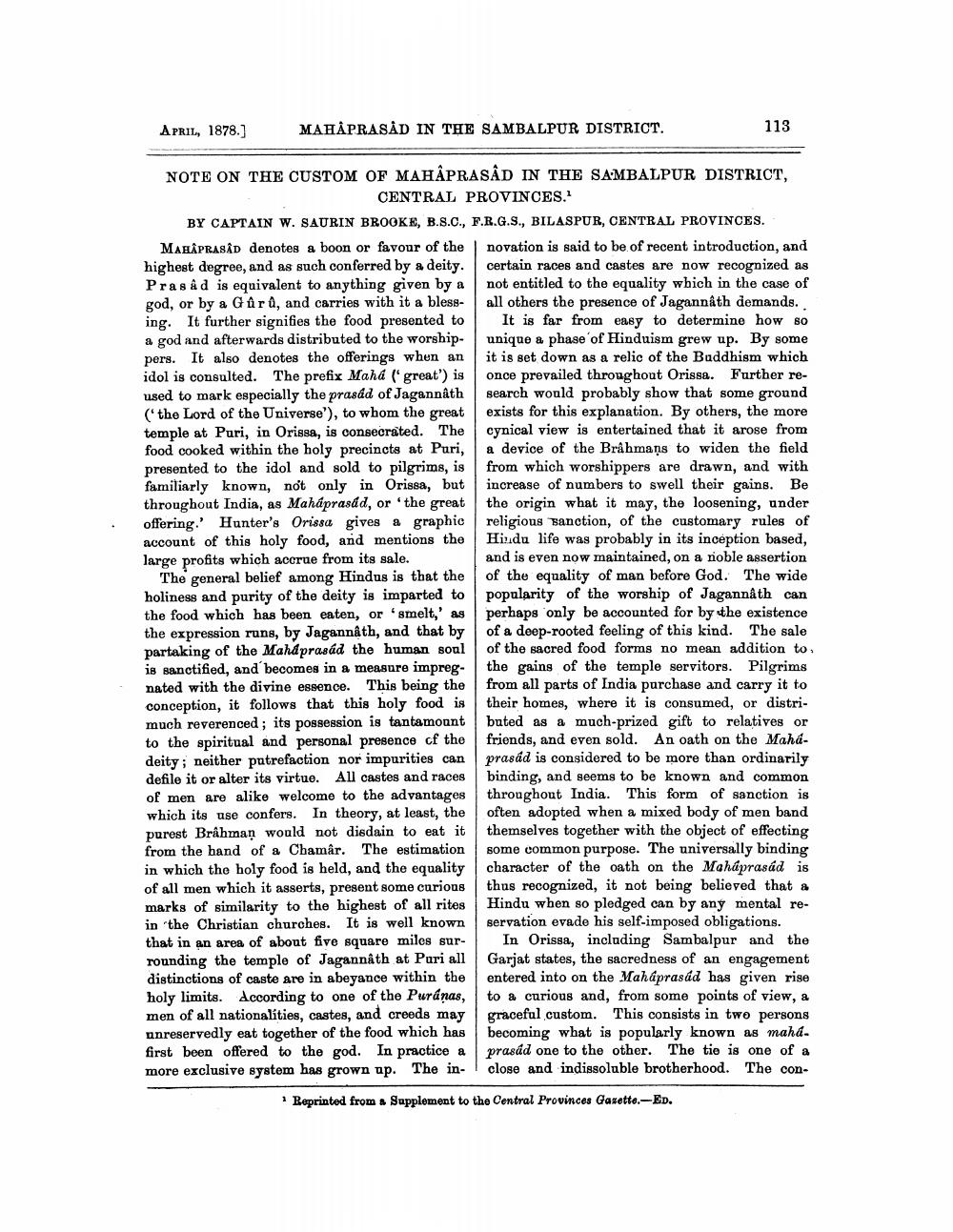________________
APRIL, 1878.]
MAHAPRASAD IN THE SAMBALPUR DISTRICT.
NOTE ON THE CUSTOM OF MAHAPRASAD IN THE SAMBALPUR DISTRICT,
CENTRAL PROVINCES.1
113
BY CAPTAIN W. SAURIN BROOKE, B.S.C., F.R.G.S., BILASPUR, CENTRAL PROVINCES.
novation is said to be of recent introduction, and certain races and castes are now recognized as not entitled to the equality which in the case of all others the presence of Jagannath demands.
MAHAPRASAD denotes a boon or favour of the highest degree, and as such conferred by a deity. Prasad is equivalent to anything given by a god, or by a Gûrû, and carries with it a blessing. It further signifies the food presented to a god and afterwards distributed to the worshippers. It also denotes the offerings when an idol is consulted. The prefix Mahá ('great') is used to mark especially the prasád of Jagannath ('the Lord of the Universe'), to whom the great temple at Puri, in Orissa, is consecrated. The food cooked within the holy precincts at Puri, presented to the idol and sold to pilgrims, is familiarly known, not only in Orissa, but throughout India, as Maháprasád, or 'the great offering.' Hunter's Orissa gives a graphic account of this holy food, and mentions the large profits which accrue from its sale.
The general belief among Hindus is that the holiness and purity of the deity is imparted to the food which has been eaten, or 'smelt,' as the expression runs, by Jagannath, and that by partaking of the Mahaprasád the human soul is sanctified, and becomes in a measure impregnated with the divine essence. This being the conception, it follows that this holy food is much reverenced; its possession is tantamount to the spiritual and personal presence of the deity; neither putrefaction nor impurities can defile it or alter its virtue. All castes and races of men are alike welcome to the advantages which its use confers. In theory, at least, the purest Brahman would not disdain to eat it from the hand of a Chamâr. The estimation in which the holy food is held, and the equality of all men which it asserts, present some curious marks of similarity to the highest of all rites in the Christian churches. It is well known that in an area of about five square miles surrounding the temple of Jagannath at Puri all distinctions of caste are in abeyance within the holy limits. According to one of the Puranas, men of all nationalities, castes, and creeds may unreservedly eat together of the food which has first been offered to the god. In practice a more exclusive system has grown up. The in
It is far from easy to determine how so unique a phase of Hinduism grew up. By some it is set down as a relic of the Buddhism which once prevailed throughout Orissa. Further research would probably show that some ground exists for this explanation. By others, the more cynical view is entertained that it arose from a device of the Brahmans to widen the field from which worshippers are drawn, and with increase of numbers to swell their gains. Be the origin what it may, the loosening, under religious sanction, of the customary rules of Hindu life was probably in its inception based, and is even now maintained, on a noble assertion of the equality of man before God. The wide popularity of the worship of Jagannath can perhaps only be accounted for by the existence of a deep-rooted feeling of this kind. The sale of the sacred food forms no mean addition to. the gains of the temple servitors. Pilgrims from all parts of India purchase and carry it to their homes, where it is consumed, or distributed as a much-prized gift to relatives or friends, and even sold. An oath on the Mahaprasád is considered to be more than ordinarily binding, and seems to be known and common throughout India. This form of sanction is often adopted when a mixed body of men band themselves together with the object of effecting some common purpose. The universally binding character of the oath on the Mahaprasád is thus recognized, it not being believed that a Hindu when so pledged can by any mental reservation evade his self-imposed obligations.
In Orissa, including Sambalpur and the Garjat states, the sacredness of an engagement entered into on the Mahaprasád has given rise to a curious and, from some points of view, a graceful custom. This consists in two persons becoming what is popularly known as mahá. prasad one to the other. The tie is one of a close and indissoluble brotherhood. The con
1 Reprinted from a Supplement to the Central Provinces Gazette.-ED.




